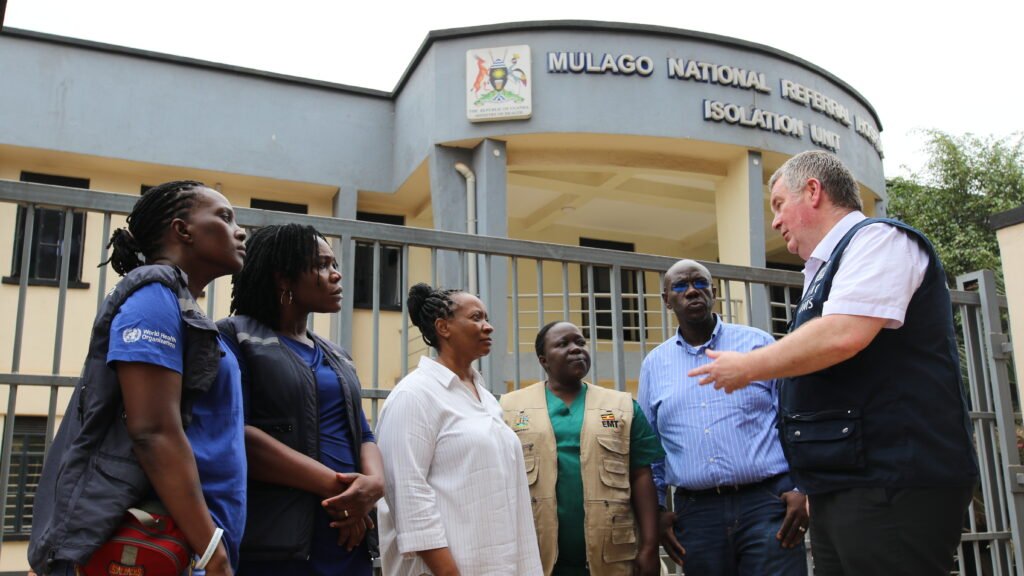The latest Ebola case in Uganda has sparked concerns as six people who were in contact with the patient have become ill. The World Health Organization’s health emergencies program is closely monitoring the situation to determine if these individuals are also suffering from the dangerous viral disease. Among those who have fallen ill are the wife of the patient who died and several health workers.
Mike Ryan, head of the WHO’s health emergencies program, emphasized that the response to the outbreak is progressing rapidly. However, the freeze on aid by the Trump administration has created shortfalls in crucial areas that the WHO has had to cover. Uganda relies on funds from the U.S. Agency for International Development for transporting samples from suspected cases to its national lab for testing. With this funding currently unavailable, the WHO has stepped in to cover these costs.
Moreover, the U.S. aid is also used for border entry-and-exit screening at key points, which is vital to prevent the spread of Ebola to other countries. The WHO will now be covering these costs as well. Ryan expressed hope that the U.S. would resume funding for these health security projects once their review is complete.
Vaccination efforts targeting the known contacts and health workers could begin as early as Sunday using an experimental vaccine developed by the non-profit group IAVI. The outbreak in Uganda involves the Ebola Sudan virus, for which there are no licensed vaccines. The IAVI vaccine, based on the approach used for the Ebola Zaire vaccine, has already been prepositioned in Uganda for rapid response.
The Ugandan government has experienced six previous Ebola outbreaks, including the two largest Ebola Sudan outbreaks on record. The current outbreak involves a 32-year-old nurse who visited multiple hospitals and a traditional healer before succumbing to the disease. Contact tracing efforts have identified at least 234 contacts, with half being healthcare workers who may not have used adequate protective equipment.
The WHO is working closely with the Ugandan government to establish treatment centers and deploy resources to contain the outbreak. The government’s quick response and transparency have been lauded by Ryan, who emphasized the need for continued support to combat the spread of Ebola in Uganda. He urged other countries not to impose travel bans against Uganda and to assist in the global effort to contain the outbreak. Support and Assistance: The Key to Rehabilitation
In the criminal justice system, there is often a focus on punishment as a means of addressing wrongdoing. However, many experts argue that what individuals involved in criminal activities truly need is support and assistance rather than punishment. By providing individuals with the resources and guidance they need to address the underlying issues that may have led to their criminal behavior, we can help them rehabilitate and become productive members of society.
One of the key arguments for providing support and assistance rather than punishment is that punishment alone does not address the root causes of criminal behavior. Many individuals who engage in criminal activities do so as a result of underlying issues such as substance abuse, mental health problems, or a lack of access to education and employment opportunities. By providing these individuals with the support they need to address these issues, we can help them break the cycle of criminal behavior and lead more fulfilling lives.
Additionally, research has shown that punitive measures such as incarceration can actually be counterproductive in some cases. Individuals who are incarcerated often face challenges such as limited access to education, employment, and mental health services, which can make it difficult for them to reintegrate into society upon release. By providing support and assistance instead of punishment, we can help individuals address these challenges and increase their chances of successful reentry into society.
Support and assistance can take many forms, including access to mental health services, drug and alcohol rehabilitation programs, educational opportunities, and job training programs. By providing individuals with these resources, we can help them address the underlying issues that may have led to their criminal behavior and empower them to make positive changes in their lives.
In conclusion, what individuals involved in criminal activities truly need is support and assistance, not punishment. By providing individuals with the resources and guidance they need to address the root causes of their behavior, we can help them rehabilitate and become productive members of society. It is time to shift our focus from punishment to rehabilitation and give individuals the support they need to turn their lives around.


